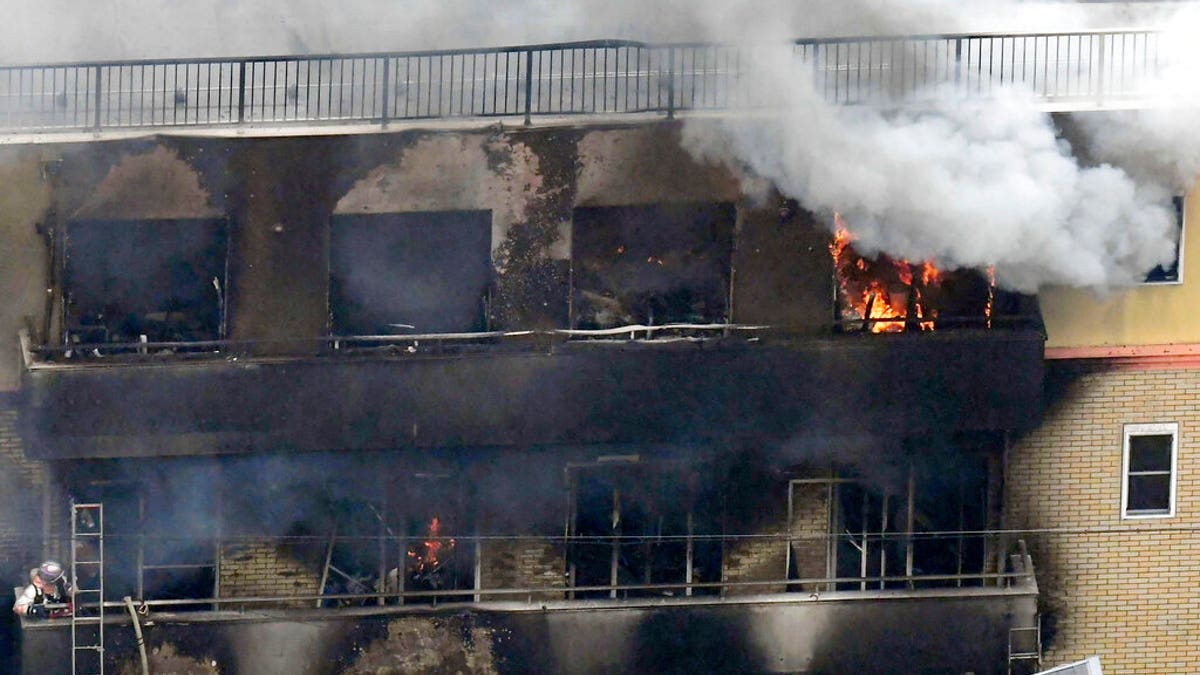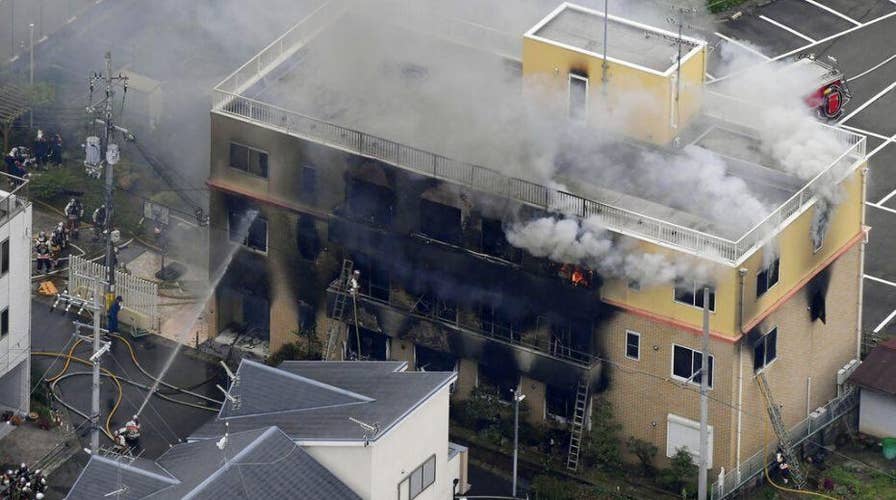Man under arrest in Japan after fire leaves 23 people dead
Report: Man in Japan arrested after allegedly starting a fire that authorities fear left at least 23 people dead and another 36 injured.
The man accused of setting fire to a Japanese animation studio on Thursday, killing 33 people and injuring dozens, reportedly had a grudge against the company who he believed had "stolen novels" from him.
Kyoto police identified the man as Shinji Aoba, a 41-year-old man who was not employed at Kyoto Animation and was hospitalized after allegedly dousing the entrance of the building with a liquid and igniting it.
Aoba told police that he set the fire because he thought "(Kyoto Animation) stole novels," according to Japanese media. It was unclear if he had contacted the studio earlier.
33 KILLED IN FIRE AT JAPANESE ANIME STUDIO AFTER MAN SCREAMING 'YOU DIE!' SET BUILDING ALIGHT
The shocking incident left another 36 injured and some critically wounded as it drew an outpour of grief for the casualties, most of which were employees at the studio.
University student Yuki Seki was also an anime fan and said she traveled from nearby Hyōgo Prefecture to pay her respects.
“After properly recovering while taking their time, I hope Kyoto Animation can once again share their power and energy with us,” she said.

A woman prays to honor the victims of Thursday's fire at the Kyoto Animation Studio building, Friday, July 19, 2019, in Kyoto, Japan. A man screaming "You die!" burst into the animation studio in Kyoto, doused it with a flammable liquid and set it on fire Thursday, killing dozens of people in the attack that shocked the country and brought an outpouring of grief from anime fans. (AP Photo/Jae C. Hong)
About 70 people were working inside the 3-story Kyoto Animation No. 1 studio in Japan’s ancient capital at the time of the attack. The arsonist arrived through the building’s unlocked front door while carrying two containers of flammable liquid, shouting “You die!” before dumping the fluids and setting it ablaze with a lighter.
Authorities at the scene confiscated the gasoline tanks, a knapsack, and knives, but have not yet confirmed they belonged to Aoba.
The blaze blocked the front door and quickly engulfed the workspace, rising up the stairs towards the third floor as it sent panicked employees fleeing. Some were able to escape by crawling out of windows, but many failed in their attempts to escape through the roof.
ISIS SUPPORTERS WHO BEHEADED SCANDINAVIAN HIKERS IN MOROCCO SENTENCED TO DEATH

Smoke billows from a Kyoto Animation building in Kyoto, western Japan, Thursday, July 18, 2019. The fire broke out in the three-story building in Japan's ancient capital of Kyoto, after a suspect sprayed an unidentified liquid to accelerate the blaze, Kyoto prefectural police and fire department officials said. (Kyodo News via AP)
The suspect fled the scene but was chased by studio employees who eventually caught him. He collapsed to the ground outside a house and was quickly surrounded by law enforcement.
“They are always stealing. It’s their fault,” he told policemen as they asked him why he set the fire. According to a witness who described the scene outside her house, Aoba complained bitterly about the company.
Some reports state Aoba spent three and a half years in prison for robbing a convenience store in 2012 and also had mental problems, although police have not yet confirmed the accounts.
Neighbors interviewed by NHK also said he had troubles with neighbors at his apartment building in Saitama, north of Tokyo. One man said that he had knocked on Aoba’s door to ask him to stop banging on the walls, only for Aoba to shout “I will kill you!” and grab him by his hair and shirt.
CLICK HERE TO GET THE FOX NEWS APP
Kyoto Animation, better known as KyoAni, was founded in 1981 and has produced many mega-hit anime series. Their hits include “Lucky Star” of 2008, “K-On!” in 2011, “Haruhi Suzumiya” in 2009, and a series about high school girls. The studio also has an upcoming feature film, “Violet Evergarden,” about a woman who professionally writes letters for clients.
The company has done secondary animation work on both a 1998 “Pokemon” feature that appeared in U.S. theaters and a “Winnie the Pooh” film.
Fox News' Morgan Cheung and the Associated Press contributed to this report.









































